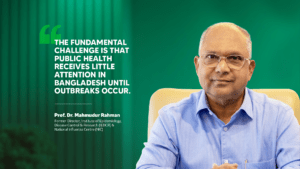Q. Let’s start with a glimpse of your journey in the music industry and how you discovered your passion for music.
My musical journey began during my school days when I discovered a passion for music that has stayed with me ever since. Despite no one in my family having ventured into the music industry before, I felt a strong urge to try something new and music seemed like the perfect avenue. This was a time before the widespread availability of the internet, so resources were limited. Nonetheless, I persevered and diligently researched the basics of software for music production. In 2012, I officially composed my first piece of music, and in 2013, I began to compose regularly. I have since continued to hone my craft, constantly striving to improve and push the boundaries of what I can achieve musically.
A big thanks to my mother and brother for always being my number one support and for always having faith in me. Furthermore, due to my location in Chittagong and the music industry is primarily based in Dhaka, I faced significant challenges in finding opportunities to release albums or perform at concerts. Undeterred, I decided to take matters into my own hands and utilize the emerging social media platform, Facebook, as a means of promoting my music. In 2013, Facebook was rapidly gaining popularity, and I saw it as an ideal platform to share my music with a wider audience. I would create a cover photo for each track and include links to Mediafire and Soundcloud, where my followers could download and listen to my music. Looking back, I’m incredibly grateful for the support of my early followers, many of whom may recall the exciting time when a lot of great music was being released.
My hard work and dedication started to pay off as my music gained traction through word of mouth from my friends and fans. I was thrilled to receive such positive responses and to see my audience eagerly anticipating my next release. While there was no monetary benefit, the satisfaction of producing music that people enjoyed was more than enough.
By 2015, I had already released more than 50 songs, and one of my tracks, ‘Manena Mon,’ caught the attention of Imraul Rafat Bhai. He wanted to use it in a drama for ‘Close Up Kache Ashar Golpo’ called ‘Protikkha’. I was shocked and elated that my song was selected for such a popular show, especially considering that I was just a small composer working out of my small room, without any studio or industry connections.
This experience opened doors for me in the entertainment industry, and I began to work on more dramas in 2015, leading up to the release of my first album. Looking back on my journey, I feel grateful for the opportunities that have come my way, and I am excited to continue creating music that resonates with my fans and brings joy to their lives.

Q. What/Who are some of your biggest musical influences and how have they impacted your work?
From a young age, I have always had great admiration and respect for Tahsan Bhaia. He is primarily known as a singer, but his music has had a profound impact on me, and I have listened to all of his songs. I owe my early exposure to his music to my elder brother, who was a fan, and I would often find myself drawn to the melodies and lyrics of his songs. As I grew older and started to develop my own passion for music, Tahsan Bhaia’s music continued to inspire me. His ability to convey emotions through his music and lyrics is something I have always admired, and he has been a great source of motivation for me in my own musical journey.
When I first started my musical journey back in 2012/2013, composers weren’t as well-known as singers, directors, or actors. However, one composer who truly stood out for me was Fuad Bhai. His albums, which featured collaborations with various artists, inspired me and made me realize the vast potential that existed for composers in the industry. The craze that Fuad Bhai created in the market with his music was truly remarkable, and his albums remain a vivid memory for me to this day. It was because of his music and his influence that I decided to focus more on composing and paving the way for newer artists in the industry.
On an international level, one composer who has truly captured my attention and admiration is RedOne. Known for his work with artists such as Pitbull, Enrique Iglesias, and others, RedOne’s music is not necessarily in the same genre as mine. However, I find myself drawn to his music and enjoy listening to it immensely.
Q. Walk us through your creative process, starting from composing to writing a new piece of music.
As a composer in the entertainment industry, my work typically begins with a director approaching me with a script and providing me with details on the story and the mood that they want to convey through the music. Based on this brief, I start working on the composition and begin to prepare the music.
Once I have some samples ready, I would share them with the director along with a demo of the tones. Together, we would choose the best option that fits the vision of the project. After finalizing the composition, we would then begin the search for the perfect artist to sing the song. In some cases, I may take on the responsibility of selecting the artist myself, based on my experience and knowledge of their vocal abilities. This can be a challenging but rewarding process, as finding the right voice to bring the music to life is crucial in creating a successful final product.
As a composer, it is important to recognize that not all music may fit our own voice or tone. While we may have a deep understanding of the music we create, it does not necessarily mean that we should be the ones to sing it. In fact, it is essential to be open-minded and seek out the best artist for each composition to bring it to life.
For example, during the peak of the Covid pandemic, I composed a song that was later sung by Tahsan Bhaia in 2022. Despite receiving requests from various directors and artists who were interested in singing or using the song, I remained steadfast in my decision that Tahsan Bhaia would be the ideal artist to bring my composition to life. This decision paid off, as the song has already been nominated for awards by the prestigious ‘Meril Prthom Alo’ and Tahsan Bhaia himself has expressed his enjoyment of singing it.
Overall, as composers, it is crucial to be flexible and collaborative in our approach, working closely with other artists and professionals in the industry to ensure that our music reaches its full potential.

Q. Can you explain the relationship between music and emotions, and how you as a musician or singer incorporate emotional elements into your work?
For me, it is a fundamental requirement to express emotions through my music. There can be many types of lyrics as well as various types of visualization. I mostly work in 2 primary genres, either sad or soft romantic. So most individuals listen to my songs during their sad times. For that audience, music plays a key role, and it must resonate with their emotions. Music is the bridge that helps lyrics connect with people’s emotions and that is my goal while I compose my music. I want to bring simplicity to music that connects with the listeners effortlessly.

Q. As a musician, how do you balance live performances with the more controlled environment of recording in a studio, and which do you find more challenging overall?
The primary challenge faced by composers and playback singers when performing live music is the pursuit of perfection, which can be achieved during a recorded version. In the studio, we work tirelessly day and night, repeatedly attempting until we achieve the desired level of perfection. However, this level of perfection is not always attainable during a live performance. In addition, after a live session, I often feel that I could have done better. This constant pursuit of perfection can be challenging. Live performances allow only one attempt, and I always feel that I could have done better every time I rewatch any of my live performances.
Q. Can you share any insights into the business side of the music industry, such as marketing, distribution, or intellectual property?
A decade ago, the senior artists who inspired us fought relentlessly against piracy and encouraged people to purchase their work. Fortunately, at present, there are many platforms providing support that was not available before. Unlike in the old days, numerous platforms enable artists to earn revenue from their music if they produce quality content and have a decent listener base. Artists have recently become more aware of these opportunities and can now generate income from different platforms. As an industry, we are striving to work towards mutual understanding so that everyone can benefit.
Q. What are the key differences between the music industry of Dhaka and Chittagong?
While advanced facilities and audio gear are readily available in Dhaka, the situation is quite different in Chittagong. We can only rely on 2-3 studios, whereas Dhaka has numerous high-quality studios. Despite this, working in Chittagong has its blessings, as we have a strong community that always comes forward when we need help. This strong bond allows us to work together toward the betterment of the music industry as a whole.
Q. Are there any upcoming projects or collaborations you’re particularly excited about?
We are planning to launch a few new songs for TV dramas during the upcoming Eid, and we will also release them on our YouTube channel. Additionally, we are looking forward to introducing new compositions in the future.






